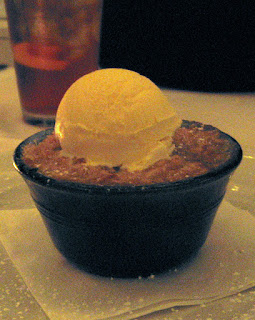Last night, my parents and I were waiting patiently in the back row of the Griffith Film Theater for the Best of Enemies program to start. The author of the book, Osha Gray Davidson and activist, Ann Atwater, were about to speak. Ten to fifteen minutes after six, a well-dressed man walked up to me and said, "This auditorium really isn't wheelchair accessible, is it?" I explained that this was as good as it gets. He replied, "Well, Ann Atwater is in a wheelchair." That wasn't good. I didn't think it was possible to get down to the stage. We briefly talked about the back lower entrances and the steps leading to them. Finally, it looked as if people were coming though the doors below. They must have carried her or rolled her down the steps somehow. The man thanked us and walked down toward the stage, where he greeted them and sat down in one of the two chairs set aside for the speakers. The man I'd been talking to was Osha Gray Davidson.
Reading a book during almost every non-working moment, finishing it with just hours to spare and then hearing at least one of the people about whom the book was written and its author is an unusual experience. The closest thing I can think of is reading a book and then seeing the movie afterwards, with excellent casting. You try to fit every phrase into the context of what you've read and wonder if there are any inconsistencies. You incorporate the voices and the mannerisms into scenes that you've already imagined.
The book is, of course, told from Davidson's point of view and illustrates his conclusions. It, therefore, wasn't surprising that he didn't seem to contradict them, although he did allow that some of his criticisms of the "black elite" had been too harsh. To me, it was also interesting to hear Atwater's views. Davidson's theme of the book was that the problems are not due to race so much as class differences, but Atwater did not seem to believe that. She said it was all about race. I agree with Davidson, because while I think that while xenophobia and cultural differences are prevalent, I feel that racial distinctions are arbitrary. Discrimination based on poverty, however, is almost ubiquitous. The greater the disparity of wealth, the easier it is for the poor to be subjugated, regardless of physical attributes.
I was also struck by how much religion is an important part of Atwater's life. It's what motivates her and what she advocates as the solution to society's ills. When I encounter someone who has such profound and obviously sincere faith, it astounds me just how differently they see the world from how I do, particularly when their goals are admirable. Religion as a driving force, for either side, was not addressed in the book.
Again, the book was fascinating to me. Not only was the historical information educational, but it helped me visualize what life was like for my parents, who lived in Durham while attending college and graduate school in the 60s. C.P. Ellis, the former Klansman, worked at Duke from long before I was born until two years before I matriculated. It mentions the Duke student demonstration demanding fair staff wages in which my Dad's cousin protested. It describes the Durham fires and the violence of which I'd heard stories. Davidson even wrote of the rally where Joan Baez briefly performed on campus, which my dad attended.
I mentioned in my earlier post that some of the people mentioned in the book are active in politics today. It actually mentioned primarily the parents of individuals who are prominent in Durham today. David Stith, who, according to the book, had Atwater and fellow protestors hosed down, is the father of Durham mayoral candidate Thomas Stith. Davidson quotes Elizabeth Tornquist, a writer for the alternative publication, the Anvil, who is the mother of Amy Tornquist, chef and owner of Watts Grocery. The son of Floyd McKissick, former leader of CORE, was recently elected by the Durham Democratic Party to the North Carolina State Senate.
 The event drew a good sized crowd of perhaps 250 to 300 people. The audience ranged from Duke faculty, staff and students to high school students and other members of the community. Following the question and answer session, there was a reception in Perkins Library where audience members had the opportunity to meet Davidson and Atwater and get their copies of the book autographed. I am profoundly honored to have been allowed to have my photograph taken with Ann Atwater, who has contributed so much to Durham and to all of us.
The event drew a good sized crowd of perhaps 250 to 300 people. The audience ranged from Duke faculty, staff and students to high school students and other members of the community. Following the question and answer session, there was a reception in Perkins Library where audience members had the opportunity to meet Davidson and Atwater and get their copies of the book autographed. I am profoundly honored to have been allowed to have my photograph taken with Ann Atwater, who has contributed so much to Durham and to all of us.














































